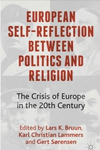European Self-Reflection Between Politics and Religion - The Crisis of Europe in the 20th Century
Edited by Lars K. Bruun, Karl Christian Lammers and Gert Sørensen
Palgrave Macmillan, May 2013
 Building on the German cultural analyst Siegfried Kracauer, the Italian microhistorian Carlo Ginzburg took up the idea of working with various optical perspectives – from close ups to long shots. Employing this differentiated approach to cultural studies, the book suggests a fresh approach to the intertwining of political and religious agonies in the period 1914-1991. In fact, the long 'European civil war' – with two world wars and a cold war – marked a paradigm shift decisively changing Europe's attitudes and ways of relating to the world. What characterises Europe is that far from being formed by a one-track development of progress and emancipation, it has followed several tracks or fault lines, creating a number of dualities and contrasts in the European self-perception such as those between secularisation and religion, and between democratic and authoritarian forms of government. The present book seeks to clarify how the 'European civil war' arose, revolving, as it did, round the fundamental question: what should Europe be?
Building on the German cultural analyst Siegfried Kracauer, the Italian microhistorian Carlo Ginzburg took up the idea of working with various optical perspectives – from close ups to long shots. Employing this differentiated approach to cultural studies, the book suggests a fresh approach to the intertwining of political and religious agonies in the period 1914-1991. In fact, the long 'European civil war' – with two world wars and a cold war – marked a paradigm shift decisively changing Europe's attitudes and ways of relating to the world. What characterises Europe is that far from being formed by a one-track development of progress and emancipation, it has followed several tracks or fault lines, creating a number of dualities and contrasts in the European self-perception such as those between secularisation and religion, and between democratic and authoritarian forms of government. The present book seeks to clarify how the 'European civil war' arose, revolving, as it did, round the fundamental question: what should Europe be?
